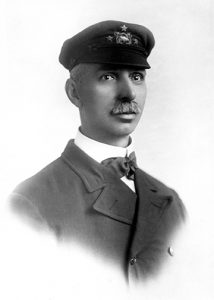Commodore Frank H. Foster, III – January, 1985

About three years ago I tracked down Kyle Armstrong’s daughter who lived in Columbus. I asked her if she had any of her father’s old source materials from which he wrote the book History of Buckeye Lake Yacht Club. After searching for a couple of days, she told me she could find nothing. So, I gave up and thought the materials were lost to history.
Recently Comm Jacobs appointed me Historian. I was given several boxes of materials collected by former Historians and members and discovered, much to my surprise, that scrapbooks had been kept in the past and contained not only official papers of the Yacht Club, but also newspaper clippings and the like. Apparently, many of these materials survived and probably served as Kyle Armstrong’s source materials.
I hope from time to time to leaf through these materials and write about interesting historical events. To the extent I can, I will reproduce some for printing in the Log. If any members have historical photographs or documents, I would greatly appreciate the opportunity to copy them. The Board of Governors has given me a small budget to allow some copying of photographs. My long range goal is to prepare a permanent historical display.
One interesting document is the House Committee Report of September 27. 1914. The House Committee reported that it was handicapped through the noncompletion of our existing club house. “We were unable to enforce any rules that with a perfectly completed home we could have done, and again were not able to entertain the families of the members this year.” “… our rooming feature has in a measure been a success from a financial standpoint.”
In May the Club hired Mrs. A. C. Jones and husband. “They too have the privilege of serving meals to Club members and their guests.” The arrangement did not prove satisfactory.
“The fault does not lie entirely with the caretaker because I want to be fair to them, some of our members have shown an utter disregard for the rules of the Club and the maintenance of a first class club home, losing sight that the reputation of the whole club is at stake, and in many instances beating the club out of the room rentals as well as the pilfering of various articles of wearing apparel and in two instances money from the rooms.”
“The fact that the caretaker was to closely engage in the kitchen and the working of the money making part, kept them away from the duties of watching the registrations and the collections from the rentals of rooms to some extent.”
Not everything was better in the good old days. The club at the time was only eight years old and was struggling with a problem which all clubs see from time to time. As stated in that report.
“It has come to the attention of the committee that the constitution has been fratured many times as regards to bringing of Liquor in various forms both into the clubhouse and boat stalls, and that on several occasions members have come into the club house at unseemly hours and in an intoxicated condition much to the discomfiture of the other guests of the club.
This must be taken in hand by the club and positively stopped if you expect to have your club a sucess and expect to have the support of the respectable class of lake dwellers and club members.”
The divisions in the country which ultimately led to prohibition, as well as the origins of our tradition of a keg at the annual meeting, were apparent in a letter from W. L. Whitacre, Chairman of the House Committee, to Guy Sackett, William Frisbee, and George Pierce, the Entertainment Committee, dated September 22, 1914.
“Referring to the talk that the writer had with you Monday, noon, relative to lunch for the annual meeting, I desire to say that I have ordered the milk, cream and three dozen eggs from Rosebraugh.” (sounds like ice cream makings to your Historian) “and I will personally secure some articles for Saturday night’s supper and Sunday morning breakfast. I think I understood either Mr. Frisbee or Guy Sackett to say that we would have a keg of beer Saturday night.”
“Please understand that anything held on Saturday will not be a club function and will absolutely against the Constitution and By-Laws of the club to have any beer or other Liquors at the club house for other than club functions. So please govern yourselves accordingly: as Chairman of the House Committee I will be forced to object and I don’t think it is the proper thing to violate the Constitution anyway.”

W.L. Whitacre became Commodore in 1916. In 1937 he served the club as Secretary-Treasurer. When he died in 1938, Bob Irwin was Commodore and Chris Lambrecht was Vice Commodore. A special board resolution noted that W. L. Whitacre was a charter member of BLYC who “through precept and example emulated the highest ethical principles of stewardship.”
